第一讲 汉译英
- 格式:doc
- 大小:201.00 KB
- 文档页数:8
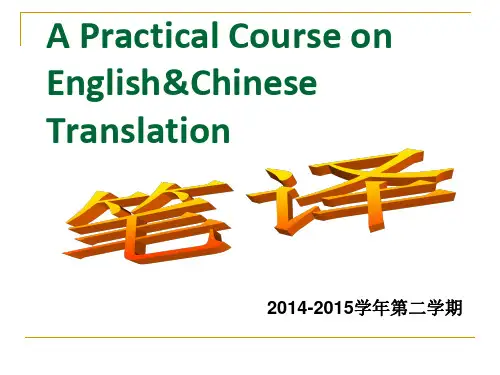
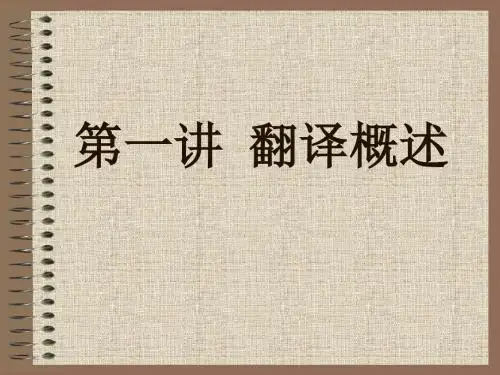
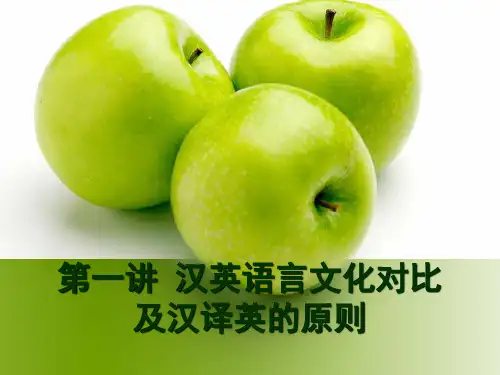
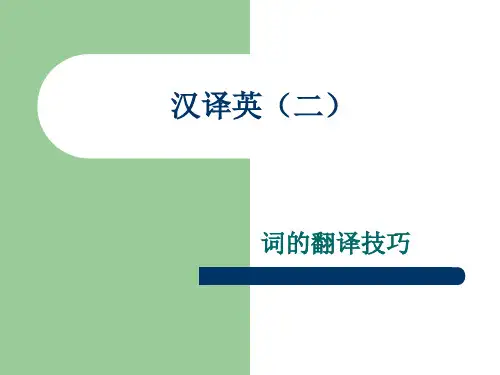
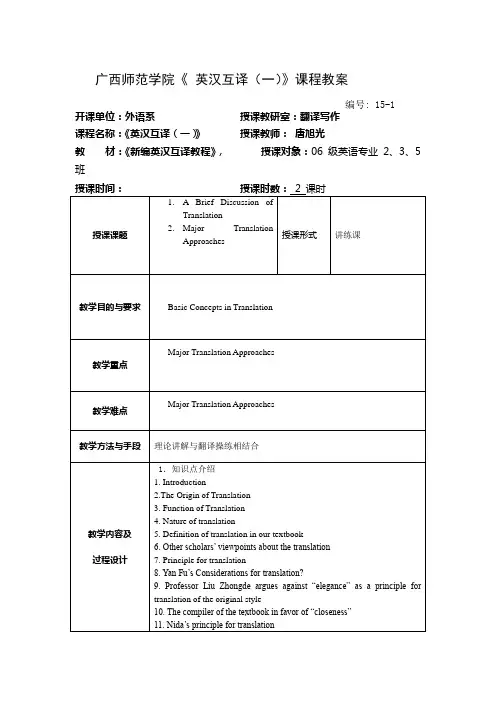
广西师范学院《英汉互译(一)》课程教案编号: 15-1 开课单位:外语系授课教研室:翻译写作课程名称:《英汉互译(一)》授课教师:唐旭光教材:《新编英汉互译教程》,授课对象:06级英语专业2、3、5班《英汉互译(一)》第一讲翻译简论与主要翻译方法(A Brief Discussion of Translation and Major Translation Approaches)1. IntroductionTranslation studies started along with translation practice. Translation theories developed flourishingly in the 20th century, especially in the second half of the last century.In fact, translation, which is a very complex phenomenon, is related to different disciplines, such as linguistics, psychology, sociology, cultural anthropology, communication theory, literary criticism, aesthetics, and semiotics. As translation study is a cross-discipline and cross-culture subject involving many aspects of human knowledge, the lack of a fully acceptable theory of translation should not come as a surprise. Meanwhile, quite a number of translation approaches and strategies have become universally acceptable and widely applicable. They are, of course, the fruits of many translation theorists and translation practitioners at home and abroad.2.The Origin of TranslationLanguage makes it possible for people to communicate with one another freely so as to complete important tasks in human life. Translation makes it possible for people from different languages to communicate with one another so as to complete important tasks in their life.Theodore Savory points out, “Translation is almost as old as original authorship and has a history as honorable and as complex as that of any other branch of literature”(申雨平, 2002:4).In Zhou Dynasty there were different forms of address for translators in different places. “Translators are called Ji in the east, Xiang in the south, Didi in the west, andYi in the north(东方曰寄,南方曰象,西方曰狄鞮,北方曰译)”(陈福康, 2000:3).3. Function of TranslationIt has helped people to better communicate with one another, and in the mean time it has facilitated the development of culture and civilization of all nations, such as the Sutra translation (佛经翻译)in China and the Bible translation in Western countries.Actually, translation, as a means to bridge different cultures, has been playing a very important role in promoting global economic and cultural development, and China in particular benefits a great deal from translation, which is obvious to all.4. Nature of translationOne school of theorists maintain that any interpretation is translation. Translation thus defined includes intra-lingual rewording(语言内的重新措辞), inter-lingual (语言之间的翻译或语际翻译)translation and inter-semiotic transmutation(符号转换).But most scholars who are interested in translation maintain that translation is a communicative activity which entails a most adequate or identical reproduction in a target language of a written message or text in a source language.5. Definition of translation in our textbook as follows: Translation or translating is a communicative activity or dynamic process in which the translator makes great effort to thoroughly comprehend a written message or text in the source language and works very hard to achieve an adequate or an almost identical reproduction in the target language version of the written source language message or text. In terms of its nature or character, translation is both an art and a science as well, since it calls for a good command of at least two languages, a flexible application of their rules, and some knowledge of at least two cultures, as well as a good grasp of the necessary translation theories.6. Other scholars’ viewpoints about the translation1). The traditional viewpoint about the nature of translation is that translation is an art only. This viewpoint is still maintained by Xu Yuanchong(许渊冲), a well-known professor at Beijing University, and a few other scholars.2). Professor Liu Zhongde vigorously advocates that translation is a science as well as an art mainly because of the following reasons:Firstly, like any other art and science, translation requires a good grasp and a flexible use of the necessary specialized knowledge and skills.Secondly, like any other art and science, translation calls for independent, honest and creative effort.Thirdly, just like any other art and science, translation demands that the translator be very careful about and highly responsible for his or her work.7. Principle for translationThe 13 statements on page 81). A translation must reproduce the words of the SLT(Source Language Text).2). A translation must reproduce the ideas (meaning) of the SLT.3). A translation should read like an original work.4). A translation should read like a translation.5). A translation should reflect the style of the original.6). A translation should possess the style of the translator.7). A translation should retain the historical stylistic dimension of the SLT.8). A translation should read as a contemporary piece of literature.9). A translation may add to or omit from the original.10). A translation may never add to or omit from the original.11). A translation should let the readers of the SLT and the target language text (TLT) have essentially the same response.12). A translation should convey what the SLT author intends to convey.13). A translation should satisfy the need of the client.Evidently, though each of the above statements is right in a certain sense, yet it is not adequate or comprehensive enough to serve as a translation principle. Some of the principles proposed by various translation theorists can find their expression in the statements given above. Interlinear translation is an illustration of the first statement. Yan Fu’s three-character principle can be a combination of statements 2, 3 and 6. Nida’s functional equivalence is best express ed in statement 11.8. Yan Fu’s Considerations for translation?Strictly speaking, a translation theory in its true sense in China originated from Yan Fu(严复). He proposed the famous triple principle for translation, namely, faithfulness(信), expressiveness(达) and elegance(雅).1). His faithfulness means that the translated text should be faithful to the original text, ie, the version should keep the content or ideas of the original.2). His expressiveness means that the translated text should be expressive and coherent without anything awkward. In other words, his expressiveness requires that the version should be fluid, smooth, and easy to read and understand.3). His elegance demands that the translated text should be exquisite and that its style ought to be very graceful.9. Professor Liu Zhongde argues against “elegance” as a principle for translation of the original styleHe argued eloquently against “elegance” as a principle for translation of the original style. We all know that not all works are characterized by the elegant style. Different writers display different styles. For instance, Lenin wrote in a bold style, and Hemingway wrote in a simple, symbolic style. Even the same writer shows different styles on different occasions for different purposes. Naturally, different works demonstrate different styles. Thus, it is impossible & absolutely wrong to achieve the effect of elegance in the translated text if the style of the original is not elegant.10. The compiler of the textbook in favor of “closeness”1). We are in favor of Professor Liu’s triple translation principle. He changed Yan Fu’s “elegance” into “closeness”, which represents his contribution to the translation theory. His “closeness” is central in meaning. It is suitable for translation of all types of texts with different styles.2). If the original text is characterized by the elegant style, the translator should do his utmost to render it into a graceful text in the target language whose style is close to the original elegant style.If the original style is highly technical with a wealth of technical terms, thetranslator ought to employ plenty of corresponding technical terms in the target language and make the translated style as close to the original technical style as possible.3). If the original style is colloquial with a lot of informal words and colloquial sentences, the translator should translate it into a text with an informal style as close as possible to the original one by using many colloquial words and informal sentences.If the original style is ornate, the translator should follow suit and make effort to render the translated style as close to the original as possible.If the original text contains some vulgar words and sentences, the translator is not entitled to replace them with elegant words or sentences, and he should reproduce the original by using some corresponding vulgar words and sentences in the receptor language. Translators are duty-bound to do so, for the simple reason that they are translators.4). As we know, Yan Fu’s triple translation principle is highly concise and well rhymed and quite easy to learn by heart, which is one of the reasons why it is still very popular in China today.Professor Liu’s triple principle is similar to Yan Fu’s in that it is equally concise and easy to remember.Though Professor Liu’s triple principle is n ot rhymed, yet it is very forceful and impressive, for the Chinese character “切” is uttered in the falling tone, carrying the implication that faithfully conveying the original style or rendering the translated style as close to the original as possible is absolutely necessary and worth the translator’s great effort.11. Nida’s principle for translationEugene A. Nida and Taber stated emphatically (1969:12): “Translation consists in reproducing in the receptor language the closest natural equivalence of the source language message, first in terms of meaning and secondly in terms of style”.His dynamic equivalence is defined as a translation principle, according to which the translator seeks to translate the meaning of the original in such a way that the target language text wording will produce the same impact on the target text audience as the original wording does upon the source text audience. Later on, Nida changed “dynamic equivalence” into “functional equivalence”, because it seemed much more satisfactory to use the expression “functional equivalence” in describing the degree of adequacy of a translation.12. The literal translation approachProfessor Liu Zhongde (1994: 172) defines literal translation as follows: “In the process of translation, literal translation treats sentences as basic units and at the same time takes the whole passage into consideration; a translator who attaches great importance to literal translation does his or her best to reproduce the ideas and writing style of the original work, retaining in the version as many rhetorical devices and sentence structures of the original as possible.”ExamplesHe is said to be a rough diamond.人们说他是一块浑金璞玉。
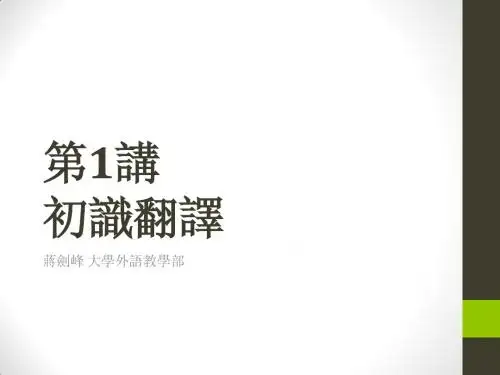
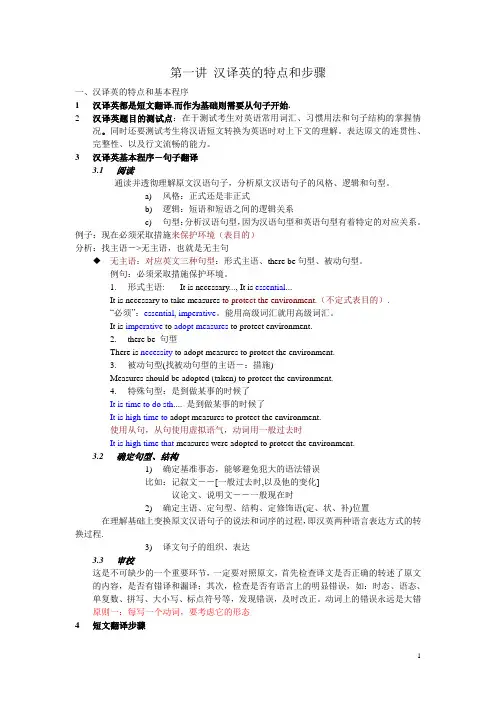

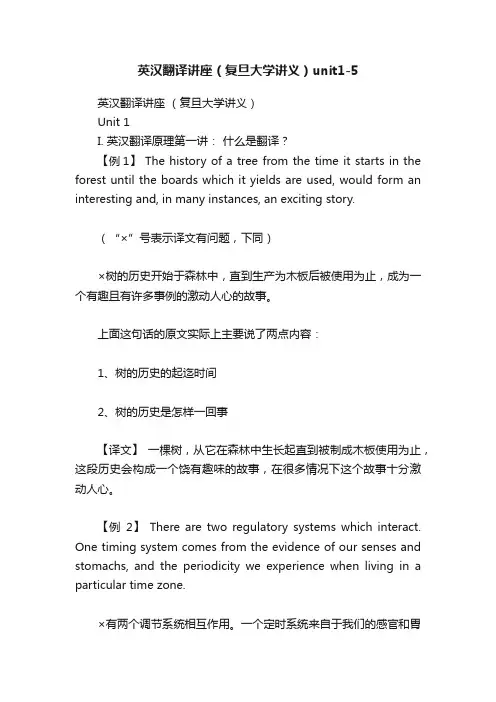
英汉翻译讲座(复旦大学讲义)unit1-5英汉翻译讲座(复旦大学讲义)Unit 1I. 英汉翻译原理第一讲:什么是翻译?【例1】 The history of a tree from the time it starts in the forest until the boards which it yields are used, would form an interesting and, in many instances, an exciting story.(“×”号表示译文有问题,下同)×树的历史开始于森林中,直到生产为木板后被使用为止,成为一个有趣且有许多事例的激动人心的故事。
上面这句话的原文实际上主要说了两点内容:1、树的历史的起迄时间2、树的历史是怎样一回事【译文】一棵树,从它在森林中生长起直到被制成木板使用为止,这段历史会构成一个饶有趣味的故事,在很多情况下这个故事十分激动人心。
【例2】There are two regulatory systems which interact. One timing system comes from the evidence of our senses and stomachs, and the periodicity we experience when living in a particular time zone.×有两个调节系统相互作用。
一个定时系统来自于我们的感官和胃的证明,就是当我们生活在一个特定的时区所经历的周期性。
【译文】人体有两个相互作用的时间调节系统。
一个时间调节系统依据感官和胃发出的信息,依据我们生活在某个时区所体验的周期性规律。
寻找对等词语和结构然后将其串接成句的翻译方法,常表现如下:1、简单语句的译文虽然生硬,但基本可读。
如:【例3】I can see three different types of composers in musical history, each of whom creates music in a somewhat different fashion.×我能看到音乐史上有三种不同的作曲家,他们中每一个人以某种不同的方式创作音乐。
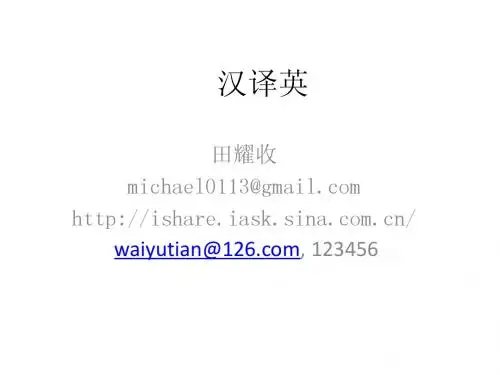
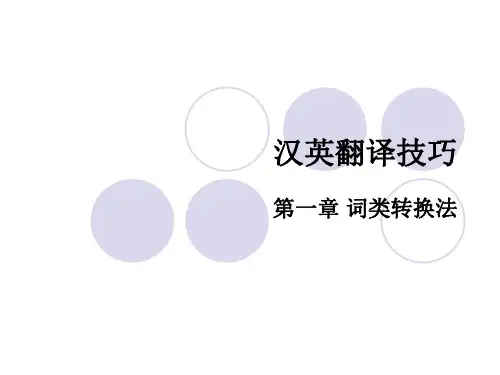
英译汉第一讲一、考研翻译的标准1.翻译的标准信、达、雅2.考研翻译的标准准确、完整、通顺•Good to the last drop.•滴滴香浓,意犹未尽。
•A diamond lasts forever.•钻石恒久远,一颗永流传。
二、考研翻译的具体困难1、词汇层面(1)人名地名的翻译(2)术语的翻译(3 )熟词的翻译(4 )生词的翻译(5 )代词的翻译•i. 众所周知的,按照约定俗成的翻译•Bernard Shaw•Bethune•Confucius; Mencius•ii.对于不太熟悉,可以先做音译,再加上括号补出英文原词•iii.对于既不熟悉,又无法确定其读音的可以照抄英文原词•地名的翻译•New York; Newcastle; New Zealand•约定俗成•大纲常见25组国名地名•Netherlands; Israel; Ireland; Brazil•常识:•Tibet; Amoy; Inner Mongolia; Macao•1994天才技术与科学发展的关系•1995标准化教育评估与标准化心理评估•1996科学发展的动力•1997动物的权利•1998宇宙的起源•1999史学研究方法•2000科学家与政府•2001计算机与未来生活展望•2002行为科学发展的困难•2003人类学简介•2004语言学•2005大众传媒•2006知识分子问题•2007法律•P8-75 kitchen rage•把握文章主题的基础上字面翻译•P7-71operational research experts ☐•P8-73 millennium technology calendar •P6-72 intellectual discipline•P3-72 scientific establishment •P11-62 be obliged to them•注意熟词僻义问题☐所谓的生词P2 –72 validate;P5-73 astrophysicists;P13-47 analogous☹真的生词P5-72 the Big Bang;P8-73 Millennium;P9-64 autonomousP13-46 Socratic2、句子层面•(1)非谓结构(2)被动语态•(3)定语从句(4)名词性从句•(5)状语从句•3、关于全文注意以下三点文章的首句与每段的首句一定要看,文章中的注释一定要留意。
第一讲汉译英一、(2012年天津市中考)1. 我经常帮助妈妈收拾房间。
I often help my mum to _____________ _____________ the room2. 2010年以来,这个地区发生了很大的变化。
Great changes have ___________ ___________ in this area since 2010.3. 他们正在建一条隧道,它将穿过这座山。
They are building a tunnel, and it will _________ _____________ the mountain.4. 他现在不在办公室。
He isn’t in the office __________.5. 我想下个星期顺便看望一下吉尔。
I think I’ll _______ __________ on Jill next week.二、(2012年北京市中考)1. 很抱歉我没能参加你的生日晚会。
_____for missing your birthday party.2. 你在课余时间喜欢读书吗?Do you _____ in your spare time?3. 杰克会和同学们相处得很好。
Jack will _____ his classmates.4. 这个演讲非常精彩。
我们都听得很认真。
The speech _____ we all listened carefully.5. 他们很难在这么短的时间内想出新的办法。
_____ a new way in such a short time.三、(2012年兰州市中考)1、平衡的饮食能使你保持健康。
Eating a balanced diet can make you ______ ______.2、为了鼓舞医院里的孩子们,这位年轻的志愿者常去为他们唱歌。
This young volunteer often sings for the children at the hospital to _____them _______.3、总的来说,法国是个消费很高的地方。
In _______, France is quite an expensive place.4、新体育馆的设计图样将在图书馆展出。
Designs for the new gym will be on _______in the library.5、每个人登机前都要通过安检。
Everyone must go _______the security check before boarding the plane.四、(2012年烟台市中考)1. 据调查,许多学生都会为了实现自己的目标而努力学习。
__________ ________the survey, many students were willing to work hard to achieve their aims.2. 我更喜欢歌词很棒的音乐。
I ____________music that __________ great lyrics.3. 你们反对在城里建一个新的动物园吗?Are you_________ _________a new zoo in the town?4. 我认为年轻人应该把更多的注意力集中在工作上。
I think young people should ____________more ___________their work.5. 听到这坏消息,Robert默默地跟他的朋友一起走回了家。
When he heard the bad news, Robert walked home together with his friends______ ______.6. 制作香蕉奶昔的第二个步骤是将香蕉切碎。
The second step of making a banana milk shake is _______ ______the bananas.7. 这部电影太乏味了, 以至于我看到一半就睡着了。
The movie was so boring that I __________ ________half way through it.8. 如果你弟弟未经允许拿走了你的衣服你会怎么办?What would you do if your brother took away your clothes __________ ___________?9. 什么时候动身取决于天气条件。
When to start __________ ___________the weather conditions.10. 他在火车站偶然遇到了他的一位老校友。
He met with an old schoolmate of his ________ _________at the railway station.五、(2012年黄石市中考)1、外面太热,我宁愿呆在家里,也不愿去钓鱼。
It is too hot outside, I would _____stay at home ______go fishing.2、你介意在我外出度假时照顾一下我的猫吗?Would you mind ______ _______of my cat while I am out on holiday?3、你应该找份兼职以多赚点钱。
You _____ _______to find a part-time job to earn more money.4、如果你坚持你的梦想,终有一天它会成真。
If you hold on to your dream, it will _____ _______one day.5、很抱歉又迟到了,我保证下次不会了。
I am very _____ ______being late again. I promise no next time.6、为了保持健康,我们别无选择,只有健康饮食和加强锻炼。
To keep fit, we have no choice ______ ______eat healthily and take exercise.7、英语演讲比赛直到下午3:30才开始。
The English Speech Contest _____ begin _____3:30 in the afternoon.8、当观众们看到林书豪时,他们激动得大喊大叫。
When the audience saw Jeremy Lin, they got _____ excited ______they cried out.9、让我们非常高兴的是,刘翔有希望在严重受伤后又夺金牌。
_______ our great _______,Liu Xiang is expected to win gold medals again after he was badly hurt.10、他应该专心学习,而不应该如此关注电脑游戏。
He should concentrate on his studies instead of ______ so much ______ to computer games.六、(2012年自贡市中考)1.尽量仔细一些,下次就会更少犯错误了。
Try to be more careful then you'll fewer next time.2.你认为东方广场和新建的大道怎么样?What do you think of the Dong fang and the new ?3.学英语最好的方法是尽可能的多说。
The best way to 1earn English is to speak it as as ·4.在二十一世纪,那些观念陈旧的人将落后于时代。
In the 21st century, those people old ideas will be left the times.5.嘲笑处于困境中的人是不礼貌的。
It's to laugh at those people in ·七、(2012年盐城市中考)1、我打算给Peter买一下礼物。
I am going to ___________________________________________.2、我长大了想当一名社会工作者。
I want to be a social woker _________________________________.3、盐城有许多公园,你最喜欢哪一个?There are many parks in Yancheng._____________________________.4、颜色能够改变我们的心情,使我们感觉快乐或悲伤。
Colors can change our moods and _____________________________.5、我难以想象未来火星上的生活会是什么样。
I can not imagine ________________________________________.八、(2012年淮安市中考)1、在西方国家,许多家长经常留一些时间带孩子们去博物馆。
In _______,many parents often set aside some time to ________ to museums.3、我们不能只想着自己而不关心他人。
We can not only _____ourselves and never ___________ others.4、“素食星期一”建议人们每周至少有一天不吃肉,这样我们可以更好地保持健康。
“Meatless Mondays ”advise people __________at least one day each week, so we can______in a better way.6、交通安全非常重要,过马路要小心。
Traffic safety is very important.We should _________ when ____________.7、迈克,你要多做户外运动而不是整天在网上聊天。
Mike, you should do more outdoor activities _______________all day.九、(2012年陕西省中考)1. 英语是你最喜欢的科目吗?Is English your ?2. 每天读书是个好习惯。
It’s a good habit to every day.3. 帮助别人就是帮助我们自己。